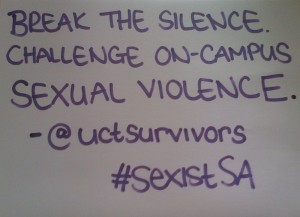As a young girl, I had a number of awful encounters with sexual violence. I was raped in my early teen years and endured street harassment while walking to and from school. I longed for a space where I would be safe and understood, and where my gender would not make me vulnerable.
I thought that the University of Cape Town was this space. I came here with the hope of finding open-minded, well-informed people. I was excited to learn and grow in an environment free of patriarchy and bigotry. I truly believed that educated people were less likely to be oppressive.
I was awfully naïve.
I heard casual victim blaming, sexist remarks and rape jokes nearly every day. Within my first three months of university, a friend saw a classmate throw condoms at one of the few girls in their engineering course. A classmate ran to me, shaking, after she overheard a group of boys joking about whether they would rape an acquaintance or not. Another classmate approached a male lecturer to apply for an extension on an essay; he repeatedly told her she was pretty and touched her hip and chest without her consent.

Sexual harassment in academia is powerful because our harassers have overt and institutional power over us: they are often our lecturers and tutors, and have the power to determine our careers.
And yet there is very little discussion about on-campus sexual assault. While previous campaigns run at UCT have highlighted sexual violence, they have never acknowledged that it actually happens on campus, and that it is classmates, lecturers and administrators who are the perpetrators. Structures that exist to deal with on-campus discrimination and harassment have failed to release statistics or reports on its occurrence on campus.
This lack of conversation leads victims of on-campus sexual harassment and discrimination to feel alone, abnormal, and often, at fault. It also perpetuates the awful Monster Myth. This is the false idea that the perpetrators of violence against women are strangers, and that “normalâ€, educated and successful men aren’t capable of committing sexual violence.
This is why UCT Survivor Support was started: to provoke discussion about on-campus assault, to support and advise victims, and to increase visibility of this issue. UCT does not exist in a bubble of safety, but in a bubble of silence. It’s time we pop that bubble. Trauma should be dealt with and not swept under the rug.
UCT Survivor Support is an account run by two anonymous UCT students/staff members. We aim to create a space for conversation and activism around harassment and sexual violence at the University of Cape Town. Follow us on Twitter.
– Image via Wikimedia Commons
Have you experienced harassment in your daily life? Tell us about it, tweet us or contact one of our reporters.

![UCT upper campus [wikimedia commons] [resized]](https://www.thedailyvox.co.za/wp-content/uploads/2014/08/UCT-upper-campus-wikimedia-commons-resized.jpg)








